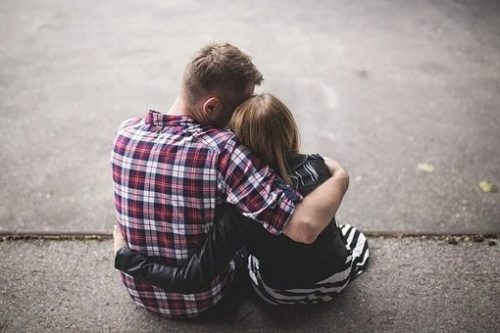What do you do when you are experiencing an anxiety attack? Let’s find out what you can do when feeling anxious and how to handle an anxiety attack that can really cause fear and panic. As a father of three cute little kids, I always thought that I could do everything for my children. And even if things are way too impossible, I always make sure to find ways to come up with solutions — even when it’s an anxiety disorder.

But sometimes, despite all my efforts, I can’t still get rid of the irrational fear and worries I have for my children. That is the reason why, at some point, I deal with my emotional and mental health (anxiety) issues alone so that my wife and kids won’t know about my mental health struggle and won’t worry about me. I thought I could handle the panic attacks and panic disorder on my own.
But the more I hide my struggle with mental illness, particularly anxiety, the more I get trapped with it. A panic attack isn’t just a little nervousness. It has physical symptoms too that can damage your health. The symptoms often take me to a different state of mind, and it entirely ruins my function as a husband and a father. In some unfortunate instances, I feel too uncomfortable to even with myself as I engage in panic attacks. There are a lot of things that occupy my head. Some of those are unrealistic, while others are mere negative thoughts. Fortunately, I did not let my fears and anxiety eat me, and I tried my best to learn more about my anxiety and panic attacks.
Understanding Anxiety & Panic Attacks
Anxiety attack, also known as panic attacks, is like a wild rollercoaster ride that your mind takes you on without your permission. It’s like your brain decided to throw a party but didn’t send you an invitation. Suddenly, you’re hit with a wave of intense fear or panic, and it feels like you’re about to jump out of your own skin!
The physical symptoms of an anxiety attack can be wild and wacky too. The symptoms might feel like your heart is racing faster than Usain Bolt, or like you can’t catch your breath, even though you’re not running a marathon. Your palms might get sweaty, your head might feel dizzy, and your stomach might start doing somersaults like an Olympic gymnast.
An anxiety attack can be triggered by all sorts of things, like stressful work situations or personal life events. And they can happen to anyone, even tough blue-collar workers! In fact, studies have shown that blue-collar workers may be more likely to experience an anxiety attack due to the physical demands of their jobs and the high levels of stress and anxiety they face. Make no mistake: anxiety disorders are no joke.
But don’t worry. If you have a disorder, there are ways to cope with an anxiety attack and get off that crazy rollercoaster ride. Lifestyle changes, like getting enough sleep, a healthy diet, and exercise, can help manage symptoms. Breathing and relaxation techniques, like taking deep breaths or picturing yourself on a tropical beach, can also help calm your mind and body.

There are also therapy and medication options available, which can be like having a trusted co-pilot on that wild rollercoaster ride. Therapy, like talk therapy or cognitive-behavioral therapy, can help you learn coping mechanisms and strategies for managing an anxiety attack. Medications, like antidepressants or anti-anxiety medications, can also be effective in reducing symptoms.
Remember, it’s important to prioritize your mental health and seek help if needed. There’s no shame in seeking professional support, and it can actually help you get back in the driver’s seat of your own mind. Aside from getting professional help, don’t be shy to seek support from those around you if you feel anxious and you want to vent your feelings. Your friends and loved ones can act out as a support group for your betterment. So hold on tight and enjoy the ride of life. With the right support and coping mechanisms, you can manage and overcome anxiety attacks!
In line with that, I found some helpful answers to these frequently asked questions about the disorder and other health conditions.
How Do You Calm An Anxiety Attack?
You can calm anxiety attacks when you breathe in slowly from your nose through your mouth. You can start deep breathing by gently closing your eyes and relaxing your body. It would be best if you recognized that you have a panic attack. That way, you easily shift your focus and practice mindfulness. After entirely understanding emotional and mental relaxation’s effectiveness, I get to free myself from too much anxiety. Every time it hits me up, I start channeling my emotional and mental energy into a productive activity. Instead of worrying too much about what could happen to my kids when I am not around them, I make sure to spend more time with them.
What Does Anxiety Attack Feel Like?
Anxiety attack often feels like you are losing control or going crazy. Sometimes, it gets accompanied by chest pain and heart palpitations. There is also the feeling like you’re going to pass out, as well as experiencing choking sensation and trouble breathing. Anxiety attack also causes chills and hot flashes. It can differ between disorders. Generalized anxiety disorder is almost always active. Other types come in waves.
What Causes Anxiety?
Some factors can cause anxiety attacks. However, the usual reason is stress. It comes from life situations that perhaps include financial issues, a death in the family, work deadlines, and social relationship problems. An anxiety attack also happens when there is an impending worry or persistent feeling of fear or anxiety, upsetting chronic illness, or other health issues. Sometimes there might be no cause, like with generalized anxiety.
What Triggers Anxiety?

Anxiety attack triggers include family history. It could also come from major life stressors, such as serious illness, a loved one’s death, and a traumatic event. These can include sexual assault, physical abuse, or a serious accident. But in my case, I often deal with a panic attack when my kids are not around. I always have these negative thoughts about my children getting hurt physically and emotionally when they are around other people. Yes, I know I can’t stop that from happening. That is why it took me a lot of time to realize that I should not be anxious and worry too much about my kids every time they are out of sight.
Do Hugs Help During An Anxiety Attack?
Fortunately, yes. Hugging impacts people’s overall health as it helps reduce stress and lower your risk of anxiety, depression, and other mental health issues. Hugs may even help you heal emotionally and mentally as it releases dopamine in the brain. It is known as the pleasure hormone that provides feelings of happiness. Honestly, it really works. When I felt a little stressed and anxious, my children would run toward me and hug me. They make me feel secure every time they hold me in their arms so tightly. That’s why it’s important to find support groups. It doesn’t just have to be from family.
What Can I Drink To Calm My Anxiety?
Valerian Root Tea, Kava Tea, Warm Milk, Peppermint Tea, Green Tea, Anti-Anxiety Smoothie, Water, Tart Cherry Juice, and Fresh Fruit and Vegetable Juice are the best drinks that help calm nerves.
Can An Anxiety Attack Go Away By Itself?
Mild anxiety can go away on its own, even right after the stressful and anxious event that caused it. Some people can handle anxiety better than others. However, in the state of chronic anxiety, the chronic health condition often persists and eventually gets worse. It is important to consult a medical health professional if anxiety symptoms persist. It is essential to manage one’s anxiety attacks, for frequent anxiety attacks of overwhelming fear may lead to anxiety disorder. People with anxiety live their everyday lives with constant struggle since their disorder comes along with unexpected intense an anxiety attack, which can be detrimental, especially when fear and anxiety overwhelm different aspects of their lives. I can’t often deal with anxiety because I understand that it is part of human nature. The particular emotion exists because there are a lot of things one cannot control that even trigger a short temper. But as long as I stay positive and concerned about my overall wellness, I know anxiety can’t stop me from taking care of myself, my wife, and my kids.
What Happens During Anxiety?
During an anxiety attack, an individual may experience chest pain or discomfort. Sometimes, anxiety gets included with chills or hot flashes. There is also trouble in breathing, and sometimes experiences a choking sensation. There is also the constant fear of death and the feeling of going crazy or fear of losing control. As a father like me, my anxiety usually starts when my kids tell me that they are experiencing emotional issues. I need to jump off my office chair and go to where my kids are.
Can It Last All Day?
Some moments of anxiety are shorter and mild compared to others. Usually, an anxiety attack lasts anywhere from a few minutes to an hour. Sometimes, an anxiety attack can last for a couple of days. It can be a difficult case of panic disorder when fear overwhelms even simple daily tasks that people do. However, this anxiety feeling is incomparable to such passing worries or stressful days for some people. Your anxiety may not go away for a couple of weeks or months. And sometimes, with its severity, anxiety can last up to many years.
How Long Does It Take To Heal?
Some anxiety conditions only take a while to heal, especially when you can incorporate certain methods to help with physical, emotional, and mental enhancement. However, the success of treatment in severe cases of anxiety disorder varies as it usually needs professional care. Thus, CBT is usually taken into consideration. Medical conditions vary with individual circumstances. Treatment options for other anxiety disorders, such as generalized anxiety disorder, social anxiety disorder, and panic disorder, may be short-term or long-term, depending on the severity of anxiety symptoms.
What Should I Do After?
An anxiety attack’s unsettling experience can cause you to feel emotionally, physically, and mentally exhausted. To lessen your symptoms, you need to practice deep breathing techniques. Close your eyes and picture yourself in a happy place. Find focus on other objects so you can distract yourself from having an escalated anxiousness.
What Should You Not Do During A Panic Attack?

There are things you should not do during a panic attack. You shouldn’t ignore your body. Listen to your needs, and don’t rely on self-diagnosis. Consult your healthcare specialist if you are not sure about your condition. And if possible, you mustn’t skip any doses of your prescribed antidepressant medicines. Besides that, I try to reach out to my wife and tell her how I feel. Luckily, she would comfort me and tell me that things would be alright. And I thank her for that.
Can Hugs Help?
Yes, hugs can help during anxiety and panic attacks. Hugs reduce stress by helping you relax your muscles, increase circulation, and soothe aches and pains. It also releases dopamine and serotonin in your body, which boosts your mood and relieves symptoms of depression. When it comes to anxiety and depression association, both can have the same coping skills and strategies.
Why Do Tight Hugs Help Anxiety?
Oxytocin is known to increase levels of serotonin and dopamine, mostly known as the feel-good hormones. Hugs elevate your mood and reduce muscle tension. Hugs can also help soothe aches and pains. It is worth it to hug the people you love next time you have an anxiety attack.
What are the three symptoms of an anxiety attack?
What triggers an anxiety attack?
What are the 5 signs of anxiety?
How can I calm an anxiety attack?
Do you cry during an anxiety attack?
The Bottom Line
In conclusion, an anxiety attack can be a real rollercoaster ride for the mind and body, but with the right support and coping mechanisms, you can conquer them like a boss! Whether you prefer to take deep breaths, picture yourself on a beach, or seek therapy and medication, there’s no one-size-fits-all solution to managing anxiety attacks.
Remember, it’s important to prioritize your mental health, especially in tough industries like blue-collar work. So next time you feel like you’re about to jump out of your own skin, just remember, you’ve got this! You’re the captain of your own ship, the master of your own rollercoaster ride, and with a little help from your support system, you can overcome anxiety attacks and other mental disorders and live your best life. Let’s ride the waves of life with confidence and excitement, one anxiety attack at a time!
If you want to learn more about anxiety disorders, you may refer to the Diagnostic and Statistical Manual of Mental Disorders Volume V (DSM-5-TR). The book includes various kinds of mental disorders. It goes through the symptoms of panic disorder, depression association with anxiety disorders, and anxiety disorders association with other mental disorders. You may also look through reliable websites and organizations online, such as the National Institute of Mental Health, for more information.